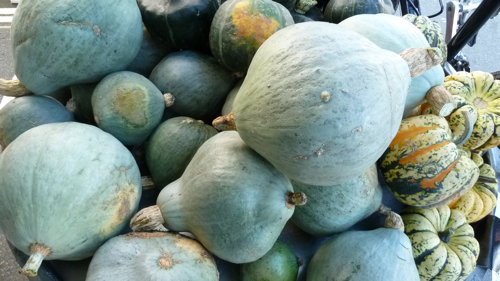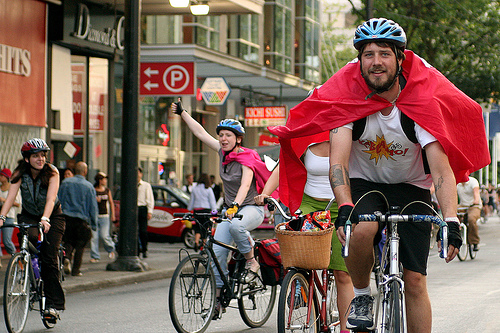Trash talks stall solutions to Metro Vancouver’s burden
I won’t get too into the specifics here, but basically, Metro Vancouver is going to see its landfills used up within two years. Solutions have been tossed about and out while very costly measures are currently in consideration. I came upon this article (via Stephen Rees) and this related article about the issues… wasted tax payer dollars, fears of consequences, and little discussion on waste management save the point from SPEC’s Eric Doherty:
“We’ve been hearing miracle cures for decades,” said Eric Doherty of the Society Promoting Environmental Conservation. “It’s still burning garbage. It’s still putting greenhouse gases into the air. It’s not the kind of solution that we need to be moving to.”
Doherty said it’s time for governments to push for policies that would reduce garbage production, and boost how much we reuse and recycle.
“We need to stop making garbage,” he said.
Reducing waste is a point I made in an earlier post on recycling (Surrey’s new initiatives).
Alas, my proverbial prayers are answered: the Vancouver Sun’s Randy Shore reports that “Next month, the regional government will introduce an aggressive, multifaceted plan to move the needle on the total amount of waste recycled across the city from 52 per cent to 70 per cent.”
Directors will vote Friday on recommendations that could lead to region-wide kitchen-waste pickup and composting, wood and construction waste collection and recycling and the construction of several plants that will convert waste to electric or thermal energy.
The plan also sets new targets for the capture of recyclable paper, plastics and electronics and household appliances.
This is good, this is very good. (Interestingly, it points out the incinerators, dubbed expensive in the other article, are actually cheaper per tonne than landfills.) Until I moved out, I composted everything organic, and my mother uses it for potting soil. Now I don’t have a place to compost but it would be wonderful if the community had one. It doesn’t require much maintenance, and we’d have free dirt! In less lazy communities, it would be a great initiative in tandem with community gardens.
Much of the front-line war against garbage will be fought in our homes. Only 25 per cent of apartment and condo dwellers are actively recycling, compared with about 50 per cent of people in single-family homes. That will have to improve.
What!!? Turns out Late Bloomer’s neighbours-not-recycling problem is a more common occurrence than I thought. This has got to change, people! She agrees that we should be reducing our waste and cleverly points out that recycling is the last of the three Rs: reduce, reuse, recycle.
![[Photo: Coffee cups are tossers]](https://www.erikarathje.ca/images/coffee-cups.jpg)
Photo by Chelsea M.
It’s everyone’s problem
Waste (excessive or otherwise) is not just Vancouver’s problem. Globally, it’s something that creates devastating pollution, economic and health crises, life for landfill scavengers, and tense relationships between citizens and governing bodies. Anything that doesn’t break down will never go away.
Green solutions take too long to take root
Paul Hawken, author of the best-selling book The Ecology of Commerce has a well-rounded list of design “strategies for sustainability,” one of which is “Transform the Making of Things.” Hawken supports the Intelligent Product System created by Michael Braungart (of Hamburg’s Environmental Protection Encouragement Agency), which categorizes products into three groups:
Consumables — “products that are either eaten, or, when they’re placed into the ground, turn into dirt without any bio-accumulative effects.” He stresses that we must design products that can be composted, in other words, “designing for decomposition.”
Durables — products that would be licensed, not sold. Cars, large appliances, and devices like DVD players “would always belong to the original manufacturer, so they would be made, used, and returned within a closed-loop system. This is already being instituted in Germany and to a lesser extent in Japan, where companies are beginning to design for disassembly. If a company knows that its products will come back someday, and that it cannot throw anything away when they do, it creates a very different approach to design and materials.”
Unsalables — toxins, heavy metals, chemicals, and radiation. “There is no living system for which these are food and thus they can never be thrown away. In [the System], unsalables must always belong to the original maker, safeguarded by public utilities called “parking lots” that store the toxins in glass-lined barrels indefinitely, charging the original manufacturers rent for the service. The rent ceases when an independent scientific panel can confirm that there is a safe method to detoxify the substances in question.”
Thus, manufacturers of everything from cereals, to cameras, to cars will have to consider the product life cycle. (Quotations from Paul Hawken, “A Declaration of Sustainability,” published in “Environmental Philosophy: From Animal Rights to Radical Ecology,” 4th ed. pp 425-6. Pearson Prentice Hall, 2005. Essay originally published in 1993 — fifteen years ago!)
You can do it!
It’s up to individuals and businesses to do their part in reducing waste. It’s also up to manufacturers to, at the very least, decrease the amount of packaging necessary and to use recyclable packaging as much as possible. We bought an everyday product whose packaging specifically said it was recyclable, which is great. It’s not the reason we bought it, but it IS a deciding factor in what eggs I choose to buy. My mother was shocked at how much packaging goes into the presentation of some Japanese products, which reminded me of a friend’s Chinese candies wrapped in edible rice paper. Now there’s a thought!
So start by buying less overall. Here are some other tips to pass on.
– Buy regularly used items in larger packages and use less of it — did you know laundry detergent amounts are based on hard water, which we don’t have in Vancouver, and are exaggerated so you use the product faster?
– Switch to bulk dry foods like parmesan cheese: you’ll save money and avoid non-reusable shakers.
– Avoid packages of individually-wrapped items.
– CAFFEINE ADDICTION? Get yourself a Thermos or travel mug for your coffee to avoid dumping so many in the trash! If one person in my office can generate 10 disposable cups a week (just 2/day), that’s 40 a month and 520 in a year — just for one person! I don’t know if coffee shops offer discounts for people who bring their own mugs, but if they don’t, they ought to.
– Switch to reusable bags for your groceries. Lee Valley sells packs of four for less than $10 — that’s less than $2.50 each and they carry a lot of stuff!
– Use biodegradable plastic bags when necessary.
– Did you know you can recycle batteries?
– Don’t buy what you don’t need. Give away or sell what you don’t want. Mend what can be mended, fix what can be fixed, and reuse what can be reused.
I expect most if not all readers here are pretty eco-conscious but we can all do a little better, AND we can all pass this information on! If you have a different readership, please do post a blurb about this issue and link back here for the rest or offer your own comments. Let’s keep this place clean for ourselves and future generations. And don’t forget the animals.


